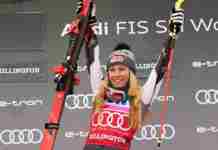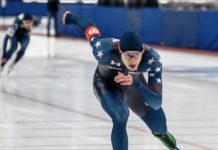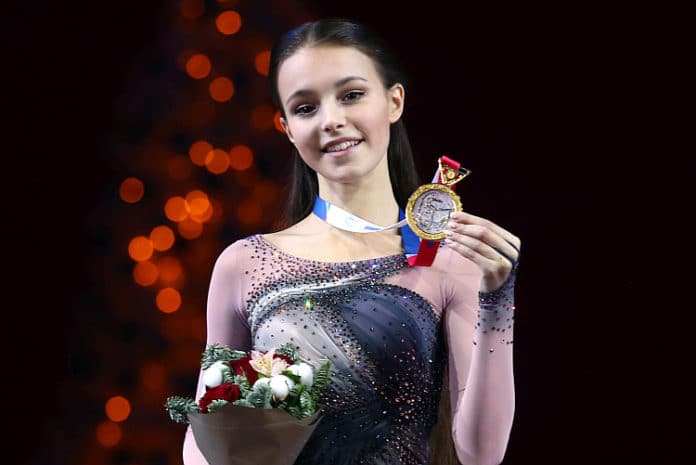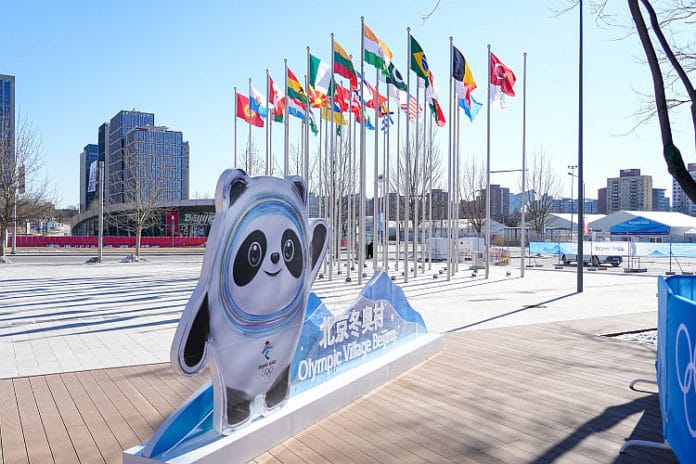(★ Friends: Thank you! Now 26 donors have covered 48% of our site costs for services for the first six months of 2022. If you would like to add your support, please donate here. ★)
= BEIJING 2022 =
From Lane One
/Updated: Biathlon previews/The questions about Russian skater Kamila Valieva almost disappeared, but questions about China as the host of the 2022 Olympic Winter Games came to the fore on Thursday in the most politically-charged daily briefing yet held in Beijing.
● International Olympic Committee spokesman Mark Adams (GBR) was asked about whether anyone from the Chinese Taipei delegation would march in the Closing Ceremony, and his reply referenced the opening, where there were representatives. But Beijing organizing committee (BOCOG) spokeswoman Jiarong Yan insisted on adding (as interpreted into English on-site):
“This is something that we really have to take a very solemn position. What I want to say is that there is only one China in the world; Taiwan is an individable part of China – this is a well-recognized international principle, and well recognized that in the international community we are always against the idea of politicizing the Olympic Games.
“The IOC has 206 members, including People’s Republic of China, the National Olympic Committee, including Chinese Taipei, the regional Olympic committee.”
● Adams was asked about the use of cotton from the Xinjiang Province – where the oppressed Uyghur population is located – in apparel provided to the IOC members and staff at the Games through a sponsorship agreement.
Adams explained that the supplier documented that no raw materials from the region were used in the items, with Yan interjecting:
“I feel obliged to make a very quick comment. I think the so-called ‘forced labor’ in Xinjiang is lies made up by deliberate groups, and the relevant organizations have provided a large amount of facts to dispute that, and we are against the politicizing of sports. Thank you.”
● Adams was then questioned about the IOC’s position on the allegations of concentration camps in Xinjiang and forced labor and made an impassioned reply:
“What I would say is that it’s not particularly relevant to this press conference, certainly not relevant to the IOC. We are very, very concerned about protecting human rights within our sphere, which is within the Olympic Games, within the staging of the Olympic Games and protecting the rights of the athletes and all participants at the Olympic Games.
“So, that’s what we do. We leave it to other organizations, the United Nations, the international organizations to look at aspects outside of what is happening here. The Games themselves are bringing a great deal of benefit to the world in terms of showing how working together we can bring a shared feeling of what the world could look like if there was cooperation.
“And, without harping on it again, you know, there was a U.N. resolution supported by every single country – 193 countries in the world – supporting these Games. We had the United Nations Secretary General at these Games. We had the President of the United Nations [General] Assembly at these Games. We have many people at these Games; the point being that they understand – and in fact, even administrations around the world who have boycotted these Games politically – understand the importance of having ways of reaching out, talking, having areas of competition and areas of dispute, but also having areas of cooperation. And the Olympic Games is an area where the world can cooperate.
“And the world is showing, the United Nations is showing, all 193 countries, unanimously, have shown that they want these Games to go ahead and who are we to disagree with that? We think the Games and the values that they bring – people see those values on their televisions or, unfortunately, not so many people here because of Covid, but when they are at the Games – they understand that bringing the world together is even more important at a time like this, even more important that we bring the world together when there is such dispute and there can be areas of discussion and debate and countries have made that aware, countries that are in dispute with China have agreed that there should be cooperation, and this is area where cooperation should take place.
“So, to your exact question, those questions taking place outside of the Games – anywhere in the world, by the way – anywhere in the world where we may be having a future Games, whether it’s Italy, whether it’s the United States coming up, or France, those are all questions for other people. Our question is to make sure that we protect the rights of the Games and the participants at the Games and the Games can take place for the athletes, against that background, to show this message of unity and solidarity to the world.”
Yan then chimed in:
“Although this question is raised to you, and although the issues are irrelevant to the Winter Games, but I still feel obliged to make the quick comment again to say that I think these questions are very much based on lies. Some authorities have already disputed such false information with a lot of solid evidence. You are very welcome to refer to all those evidence and facts. Thank you.”
● Yan was asked for more information about a situation last Sunday at which an organizing committee staff prevented a Kyodo News Service (JPN) reporter from asking questions of a Hong Kong athlete in the mixed zone at one of the skiing sites. The reply:
“We did some preliminary investigation into the situation, but we still need to gather more information on that. What I want to emphasize is that the organizing committee has been following the Host City Contract and the Olympic Charter to protect the freedom of speech of all the participants and we are also against the politicizing of sports.”
Adams stepped in and added:
“I understand it’s an isolated case. I haven’t heard of any similar case; it’s clearly not what we want. We have spoken to BOCOG and hopefully the matter is closed and there will be no repeat.”
This was the first time that these issues were raised directly during the daily news briefings, but the replies were instructive.
On the situation with women’s figure skating, Adams explained that IOC President Thomas Bach had met with the U.S. athletes concerned in the Team Event, apparently as a personal outreach to be sure the IOC’s position is fully explained. The Japanese team, fully in agreement with the IOC’s approach, did not meet with Bach, and the IOC has been in continuous contact with the Russian Olympic Committee.
The Associated Press reported that Bach provided Beijing Olympic torches to be given to the nine American team members “as holdover gifts while they await a resolution of the Russian doping case.”
Bach will appear on Friday morning, at what is expected to be the last briefing of these Games.
¶
In Russia, sports minister Oleg Matytsin said of the Valieva affair in a television interview prior to the Free Skate:
“It’s crucial that her right to participate in the Olympics was eventually restored, there is no connection between the tests that she did right before the Olympic Games with her performance at the Olympics, the tests turned out to be negative there.
“Her condition during the short program spoke of anxiety and emotional fatigue. However, she managed to overcome that, which proves that she’s the best. We believe, and we have always said it, that she is innocent. The Sports Ministry, our lawyers and the [Russian Olympic Committee] are doing everything to prevent emotions from affecting her performance and, most importantly, make sure that the truth is established in the near future.”
According to TASS, the Russian Olympic Committee “already sent an official letter to the International Skating Union (ISU) stating its solid disagreement regarding a possible revision of results in the figure skating team competitions at the 2022 Winter Games.”
¶
The theme of the daily briefing was volunteers at the Games, and the Beijing organizers explained that 18,196 people have or are serving as volunteers, with 94% under the age of 35. About 63% of these are serving in the Beijing area, 25% in Zhangjiakou (nordic skiing, biathlon, freestyle and snowboarding) and 12% at the alpine skiing and sliding center in Yanqing.
At the Main Media Center alone, some 557 volunteers have been deployed from all departments.
¶
The IOC announced that elections among the athletes at the Games for new representatives to the IOC Athletes’ Commission were completed with 80.5% of all athletes voting (2,307) and out of a field of 16 candidates, French biathlete Martin Fourcade and Swedish alpine skier Frida Hansdotter were elected.
Both are Olympic gold medalists: Fourcade won five golds in 2014-18 and Hansdottir in the 2018 women’s Slalom.
¶
The Olympic Covid incidence report for 16 February had no positives, either at the airport or in the closed loop, for either athletes and team officials or others. Only seven airport arrivals were noted, but there were 68,970 tests inside the closed loop.
Approximately 2,000 Games accreditees have already left Beijing, and about 14,000 remain within the closed loop.
The totals remain at 183 total positives (arrivals and inside the closed loop) among athletes and team officials and 324 among all other stakeholders since the closed loop began operations on 4 January.
The U.S. Olympic & Paralympic Committee reported Thursday that there were no new cases among the 508 delegates in Beijing, with no one in isolation.
¶
No ratings report from NBC on its Tuesday primetime broadcast, the fourth day in the last five without any information.
Using NBC’s data plus TSX estimates for Friday and Saturday, the first 10 days of the Games (not counting the pre-Games telecast), had an average primetime total audience of 13.3 million.
That’s down 33% from the nightly average of 19.8 million for the PyeongChang Games in 2018 and down from the 15.1 million nightly primetime average for the Tokyo Games last summer.
¶
Norway won one more medal on Thursday and leads the standings with 29 (14-7-8), just three ahead of Russia (26: 5-9-12) with Germany third at 22 (10-7-5).
Despite a day of disappointments, the U.S. remains fourth with 21 total (8-8-5), just ahead of Canada (20: 4-5-11).
For a better comparison of team strength, here are our TSX scoring rankings, using the top eight places, via the time-honored U.S. scoring of 10-8-6-5-4-3-2-1. So after 92 of 109 events:
1. 347, Norway
2. 318, Russia
3. 295, United States
4. 284, Germany
5. 256, Austria
6. 246, Canada
7. 202, Italy
8. 191, Netherlands
9. 190, Japan
10. 185, Sweden
11. 169, Switzerland
12. 166, China
~ Rich Perelman
= RESULTS: THU., 17 FEBRUARY =
● Alpine Skiing: Women’s Alpine Combined
“I don’t really understand it, and I’m not sure when I’m going to have much of an explanation. I can’t explain to you how frustrated I am to not know what I can learn from today. … Right now, I just feel like a joke.”
For the third time at the Beijing Games, American star Mikaela Shiffrin, 26, skied out of an Olympic race, this time after 10 gates in the Slalom portion of the Alpine Combined in an event where she was poised to win.
This from the winner of more World Cup Slalom races than anyone in history.
She wasn’t alone, however, as nine of the 24 races in the Slalom portion of the Combined failed to finish or were disqualified. Fellow American Keely Cashman also failed to finish.
Austria’s Christine Scheyer won the Downhill portion of the event in 1:32.42, trailed by Czech star Ester Ledecka, already with a Snowboard goal in Beijing, with Shiffrin fifth. That put the American in an excellent position to win the Combined, an event in which she is the current World Champion.
In the Slalom section, Scheyer started with a 56.83 and a 2:29.25 total, but that was quickly passed by Ledecka, who skied smartly and finished in 55.89 and a 2:28.32 total that might medal.
But Downhill fourth-placer Romane Miradoli skied out of the Slalom, followed by Shiffrin, who also fell and failed to finish. Ledecka continued to lead, finally displaced by Italy’s Federica Brignone, who skied a 54.41 for a 2:27.52 total.
Swiss Wendy Holdener, the 2018 Combined bronze winner, was 11th in the order, but the best yet, clocking a 53.31 Slalom time – best of the day so far – to take the lead at 2:26.72.
That brought up defending Olympic Champion Michelle Gisin of Switzerland, who blew through the course and posted the best time of the day by a staggering 1.06 seconds (!) to move from 12th to first in 2:25.67. It’s not only her second Olympic gold in the event, but the third straight set of back-to-back winners in the women’s Combined: Janica Kostelic (CRO) in 2002-06, German Maria Riesch in 2010-14 and now Gisin in 2018-22.
Switzerland won five of the 10 individual races in Beijing.
Shiffrin, even with a good run, would have been hard-pressed to match Gisin in the Slalom; she would have needed a 52.69 run to tie or 52.68 to win and no one except Gisin was even close to that on the course.
The mixed team event remains and Shiffrin is planning to ski in that, but the U.S. will not be among the medal favorites.
● Figure Skating: Women’s Free Skate
For those who scan these results years from now – and are unaware of the drama – Anna Shcherbakova’s Olympic victory will look quite predictable. After all, she was the reigning World Champion from 2021.
But the story was 15-year-old Kamila Valieva, the overwhelming favorite after sensational victories at the Russian Nationals and European Championships, who led after the Short Program, 82.16-80.20, over Shcherbakova, with Japan’s Kaori Sakamoto third and Russian Alexandra Trusova fourth.
Skating in reverse order of their finish in the Short, Trusova completed a challenging program – including five quadruple jumps – that scored 177.13, a lifetime best by almost 11 points, to move to into the lead at 251.73, her best-ever score by more than 10 points.
Then came Sakamoto, who scored 153.29 and totaled a lifetime best 233.13, but fell behind Trusova and into second place for the time being.
Shcherbakova skated confidently and completed a clean program, with two quads, and scored 175.75, not as high as Trusova, but enough to put her in the lead at 255.95, also a lifetime best. Sakamoto moved down to third.
Then came Valieva, who landed her first jump, but suffered four other mistakes, a hand on the ice and two falls. She was overcome by emotions at the end and afterwards and her score of 141.93 plummeted her to fourth at 224.09 and out of the medals. She had scored 168.61 and 259.06 to win the European title just a month ago.
Said British Sky Sports News senior reporter Geraint Hughes, “It’s one of the most uncomfortable moments in sport you’re likely to see.”
Sakamoto was as surprised as anyone in the building that she had won an Olympic medal. Shcherbakova and Trusova were hardly celebratory.
U.S. skaters Alysa Liu, Mariah Bell and Karen Chen finished seventh, 10th and 16th, with Liu and Bell moving up one place each from their Short Program positions with well-performed routines.
Because Valieva did not win a medal, the medal ceremony will take place. The unfinished business of Valieva’s doping positive from December will be limited to the Team Event, where Russia finished first, with the U.S., Japan and Canada placing 2-3-4 (for now).
But the investigations and the questions are not over, but in fact have barely started.
● Freestyle Skiing: Women’s Ski Cross
/Updated/Sweden’s two-time World Champion Sandra Naeslund was the overwhelming favorite to win and she did, finishing ahead of 2013 World Champion Fanny Smith of Switzerland as the two skied well in front of the other two finalists.
It was the first time that anyone other than a Canadian had won the women’s Ski Cross at the Games, in its fourth running.
The shock came later when, after a review, Smith was disqualified for illegal contact and relegated to fourth. That elevated Sochi 2014 Olympic gold medalist Marielle Thompson (CAN) to silver and surprise finalist Daniela Maier of Germany to the bronze medal!
(Thanks to reader Brian Russell for noting an error, that Thompson was second and not third!)
● Ice Hockey: Women’s final
In the sixth meeting between the U.S. and Canada in an Olympic final, the Canadians held on for a 3-2 win and won their fifth Olympic title, mostly thanks to goaltender Ann-Renee Desbiens, who frustrated the American attack again and again.
As during the group-stage game, Canada got in front early on goals by Sarah Nurse at 7:50 of the first period and Marie-Philip Poulin at 15:02. The early advantage proved crucial as the U.S. had to chase the game after that.
Both sides had 11 shots in the first period, but the U.S. poured on the offense in the second with a 13-6 shots advantage. However, it was Poulin who gave Canada a 3-0 lead with a second goal, at 9:08. The U.S. finally got a score on Desbiens – short-handed! – from Hilary Knight at 16:39, to close to 3-1.
As was the case in the first game, the U.S. was all over the Canadian half of the ice in the third, piling up 16 shots to four, but could not score until it was too late. American goalie Alex Cavallini was pulled with 3:09 to play and when Poulin was penalized for tripping with 1:25 to go, the Americans turned a 6-on-4 edge into a late goal by Amanda Kessel with 13 seconds left for the 3-2 final.
Canada had been a little better than the U.S. during the eight games the two teams played over the last five months, winning four of the six during an exhibition series and both games in Beijing. They are Olympic champs for the fifth time in the seven Olympic tournaments.
See you in Milan.
Finland won its fourth Olympic bronze – and second in a row – by shutting out Switzerland, 4-0.
● Nordic Combined: Team Large Hill/4×5 km
Norway got outstanding final legs from Jens Oftebro and Jorgen Graabak to separate from Germany, Japan and Austria and win the team relay by 54.9 seconds in 50:37.1.
Austrian star Johannes Lamparter had the lead after the second leg, but Oftebro, the silver medalist in the Large Hill event, logged the fastest time on the third leg to take the lead for good, with Large Hill winner Graabak extending the winning margin.
Behind the winners, Japan and Austria were 10 seconds back at the last exchange, but Germany’s Vinzenz Geiger – the Normal Hill gold medalist – made up more than 20 seconds on both to earn the silver. Ryota Yamamoto brought Japan home third, with Austria fourth, 4.2 seconds back.
The U.S. got a consistent performance from Taylor Fletcher (who had the fastest first leg in the relay), followed by Ben Loomis, Jasper Good and Jared Shumate, finishing sixth.
● Speed Skating: Women’s 1,000 m
Japan’s Miho Takagi won her fourth medal of the Beijing Games and her first gold with an Olympic Record 1:13.19 win in the women’s 1,000 m, overtaking 2020 World Champion Jutta Leerdam of the Netherlands for the lead in the 13th pairing.
Brittany Bowe of the U.S., skating in the final (15th) pair, won against Russian Daria Kacanova, but her time of 1:14.61 was only good enough for third.
Dutch star Antoinette de Jong won the third pair in 1:14.92 and that time held up for most of the rest of the program. Teammate Leerdam finally took the lead in the 11th pair by beating American Kimi Goetz, 1:13.83 to 1:15.40.
Takagi then defeated Russian Angelina Golikova in the 13th pairing in a very competitive race, 1:13.19 to 1:14.71. That had Takagi and Golikova standing 1-3 with two pairs remaining.
Japanese sprint star Nao Kodaira posted only the no. 8 time in the 14th pair and that left it up to Bowe.
With the bronze, Bowe won her first individual Olympic medal at age 33. Takagi now has a gold to go with silvers in the 500 m, 1,500 m and the Pursuit. Said Bowe:
“I got off to a great start, really strong and fast, but my lap speed just hasn’t been there. Miho Takagi is skating out of her mind, and I was gunning for that time, but it didn’t happen. I was going for gold, but I’ll probably take the bronze. I’m proud of the performance.”
Elsewhere:
● Curling: The U.S. men, skipped by John Shuster, won their final round-robin match over Denmark, 7-5, to advance to the semifinals, where they were promptly beaten by Bruce Mouat’s British rink (actually, Scottish), 8-4.
Mouat and Britain (Scotland) won the round-robin at 8-1 and now advance to the final to face round-robin winners Sweden (Niklas Edin), which finished 7-2 and defeated Canada (Brad Gushue), 5-3.
The U.S. and Canada will play for bronze.
¶
The women’s round-robin was completed, with World Champion Switzerland (Silvana Tirinzoni) finishing at 8-1, ahead of with defending Olympic champ Sweden (Anna Hasselborg) at 7-2. The Swiss will face Japan in one semi and the Swedes will play Great Britain (Scotland) in the other.
The U.S. women’s squad, skipped by Tabitha Peterson, finished at 4-5 in the round robin and was sixth.
= PREVIEWS: FRI., 18 FEBRUARY =
(5 events across 3 disciplines)
● Biathlon: Men’s 15 km Mass Start ~ Women’s 12.5 km Mass start
/Updated: Women’s preview added/There were two Mass Start events in the 2021-22 World Cup, won by France’s Emilien Jacquelin and Germany’s Benedikt Doll, but one of the runner-ups has to be the focus: France’s Quentin Fillon Maillet.
Fillon Maillet has won medals in all four events in Beijing so far: the Individual race and the Pursuit and took the silver to Norway’s Johannes Thingnes Boe in the Sprint and was on the silver-medal team on the relay. Can he win a medal in all five?
That hasn’t happened before; Norwegian legend Ole Einar Bjoerndalen won medals in all four men’s events as recently as 2002. And Fillon Maillet knows this event well, having won a World Championships silver in 2021.
The reigning World Champion is Norway’s Sturla Holm Lagreid. He won the first World Cup event of the year, in the 20 km Individual, and two more bronzes, including in the last Mass Start event in late January. He’s definitely in the mix.
In addition, look for the star Norwegian brothers J.T. and Tarjei Boe. Both have three medals so far: Johannes won the Sprint and took bronze in the 20 km; Tarjei was second in the Pursuit and third in the Sprint and both were on the winning relay. Johannes was second in the just-before-the-Games Mass Start event that Doll won.
Those have to be the favorites, but there are other possibilities, such as Sweden’s Sebastian Samuelsson, Vetle Christiansen (NOR), and Russians Eduard Latypov and Alexander Loginov.
¶
The women’s 12.5 km Mass Start was moved up to Friday in view of very cold weather coming to the Zhangjiakou area for Saturday. But at these Games, the only question is whether Norway’s Marte Olsbu Roeiseland can be beaten in any conditions?
Four women’s events have been held and she has won in two – the 7.5 km Sprint, the 10 km Pursuit – and was third in the 15 km Individual event. She also won a gold in the Mixed Relay.
During the World Cup season, only two Mass Start races were held and Roeiseland – the seasonal leader – didn’t win a medal in either. In December, Sweden’s Elvira Oeberg – twice a silver medalist to Roeiseland so far, but a relay winner – was the victor, ahead of Julia Simon (FRA) and Russian Kristina Reztsova. In the last race before the Olympic break, Italy’s Dorothea Wierer was the winner, beating Dzinara Alimbekava (BLR) and France’s Anais Chevalier-Bouchet, the Beijing silver winner in the Individual race.
Roeiseland won the World Championships gold in this event in 2020, but in 2021, the Worlds medals went to Lisa Hauser (AUT) and Norwegians Ingrid Tandrevold (now injured) and Tiril Eckhoff. Weirer was the 2019 World Champion and was second in 2020; Hanna Oeberg won the Worlds bronze in 2020.
So, the sure challengers to Roeiseland must include both Oebergs, Wierer, Hauser and Eckhoff, plus the French medalists Simon and Chevalier-Bouchet from this season and Alimbekava.
One more thing: don’t underestimate Eckhoff’s desire to win this race, as she has won the last two bronze medals in it, in Sochi and PyeongChang. Third time’s a charm?
● Freestyle Skiing: Men’s Ski Cross ~ Women’s Halfpipe
Both PyeongChang Olympic champ Brady Leman of Canada and current World Champion Alex Fiva (SUI) both won medals during World Cup season and are looking for more gold.
But they were not the big winners on tour this season, heading into the Games. Swiss Ryan Regez won three of the 10 events and took medals in three others. Swede David Mobaerg scored two wins and a silver; Germany’s Florian Wilmsmann took two medals, and French stars Terence Tchiknavorian (2-3-0) and Bastien Midol (1-2-1) were on the podium repeatedly.
And that doesn’t count 2019 World Champion and 2021 silver medalist Francois Place (FRA) and 2019 Worlds bronze medalist Kevin Drury of Canada.
Regez won the last two World Cup events prior to Beijing and he, Mobaerg and Tchiknavorian have been the most consistent placers coming into the Games.
¶
No doubt about the favorite in the women’s Halfpipe: China’s Eileen Gu.
Already the gold medalist in Big Air and second in Slopestyle, Gu, 18, swept all four World Cup competitions this season and is expected to win in this event. Anything less will be a major disappointment for her and for China.
But she will get an argument from the Slopestyle bronze medalist, Estonia’s 19-year-old Kelly Sildaru, who also happens to be the current World Champion, winning in 2021. She won two medals on the World Cup circuit behind Gu.
PyeongChang Olympic champ Cassie Sharpe (CAN) and bronze medalist Brita Sigourney of the U.S. are back, but the frequent medalists on the World Cup tour this season include Rachael Karker – three medals in four events – and American Hanna Faulhaber (two medals).
The form chart says Gu-Sildaru-Karker, but Sharpe has been at her best when the stakes are the highest. Gu is under pressure and needs a strong early performance to transfer the weight to her competitors. She was two-for-two in the qualifying, scoring 93.75 and 95.50 to show that she is ready; Karker was second at 89.50 and Sildaru third (87.50).
● Speed Skating: Men’s 1,000 m
Dutch skaters have won four of the last six Olympic titles in this event, and Kjeld Nuis – the defending champion from 2018 – already won the 1,500 m in Beijing. He has to be the favorite.
And teammate Thomas Krol may be a co-favorite; he was second to Nuis in the Beijing 1,500 m and won two World Cup races and was second in a third. In fact, the Dutch swept three of the four World Cups, with Hein Otterspeer winning the season opener over Krol and Nuis, and Kai Verbij won silver in the second race behind Krol. Wow.
A Dutch sweep is not inevitable. China’s Zhongyan Ning won the final World Cup race, in Calgary, with 17-year-old Jordan Stolz of the U.S. second and Russian Viktor Mushtakov in third. Russian Pavel Kulizhnikov was the 2016 World Champion in this event and second at the 2021 Worlds. Canada’s Laurent Debreuil won the bronze at the 2020 and 2021 Worlds.
Elsewhere:
● Bobsled/Two-Woman: Kaillie Humphries and Elana Meyers Taylor went 1-2 for the U.S. in the women’s Monobob and will try and do the same in the two-woman event, where both already own Olympic medals.
Humphries won Olympic golds in 2010 and 2014 while driving for Canada, and won bronze in 2018. Meyers Taylor won a bronze in 2010 as a brakeman, then took to driving and has won consecutive silvers in Sochi and PyeongChang.
During the World Cup season, Humphries and Meyers Taylor each won once, but the racing was dominated by German sleds. Laura Nolte won four times out of eight races and Kim Kalicki won twice. Defending Olympic Champion Mariama Jamanka won three silvers in the last five races and is a contender once again.
Canada’s Christine de Bruin, third in the Monobob, won four World Cup bronzes this season and will contend for bronze or higher here.
Meyers Taylor, with only one medal, but consistent finishes in the top seven, won the seasonal title over Nolte, Kalicki and de Bruin. She will have to be better to even repeat her last two Olympic silvers. As for gold, Humphries may be just too good.
● Figure Skating/Pairs: Russia and China have the favored teams in Pairs, which gets going with the Short Program.
Russia’s Anastasia Mishina and Alexander Galliapov won the 2021 Worlds over China’s two-time World Champions, Wenjing Sui and Cong Han, with Aleksandra Boikova and Dmitrii Kozlovskii taking the bronze.
In addition to these three, Russia has three-time Worlds medalists Evgenia Tarasova and Vladimir Morozov, and the medals are expected to be split among those four. Consider the 2021 Worlds scoring: 227.59-225.71-217.63-212.76 for the top four, then down to 201.18 for fifth-place Cheng Peng and Yang Jin of China. And it may not be as close in Beijing.
Sui and Han won their two appearance on the ISU Grand Prix tour and Russians won the other three, with Mishina and Galliapov winning their two appearances. At the 2022 European Championships, the Russian sweep was led by Mishina and Galliapov (239.82), followed by Tarasova and Morozov (236.43) and Boikova and Kozlovskii (227.23). There was a 43.18-point gap to fourth.
Soviet or Russian pairs won 12 straight Olympic golds (with one tie) from 1964-2006 and again in 2014, but missed the medals entirely in 2018! That will not happen in Beijing.
The American entry starts with Alexa Knierim and Brandon Frazier, the 2021 U.S. champs, who finished seventh at the 2021 Worlds in their first appearance together. Ashley Cain-Gribble and Timothy LeDuc won the 2022 U.S. Nationals and have been ninth at the 2019 Worlds and again in 2021.
= BEYOND BEIJING =
● Athletics ● “The World Athletics Doping Review Board (DRB) has agreed that the applications of 33 Russian athletes have met the exceptional eligibility criteria to compete in international competition as neutral athletes (ANA) in 2022.”
This brings the total approved for 2022 to 55 Russians; no more than 20 can compete (in total) in the World Indoor, World Outdoor, European and other championship meets this season as part of the continuing suspension of the Russian Athletics Federation over doping.
● Football ● The annual women’s SheBelieves Cup is on for the Dignity Health Sports Park in Carson, California, with the Iceland playing New Zealand at 5 p.m. Pacific and the U.S. taking on the Czech Republic at 8 p.m. (ESPN, TUDN).
The second round of matches will be on Sunday, also in Carson, with the U.S. and New Zealand and Iceland and the Czechs. The final doubleheader will move to Frisco, Texas on the 23rd (Wednesday) for the U.S. and Iceland and New Zealand and the Czechs.
U.S. midfield star Lindsey Horan is out due to injury, as is defender Abby Dahlkamper. A younger American roster is being used, with Mallory Pugh and Lynn Williams as the primary strikers and Rose Lavelle and Morgan Gautrat (nee Brian) in the midfield.
You can receive our exclusive TSX Report by e-mail by clicking here. You can also refer a friend by clicking here, and can donate here to keep this site going.
For our 832-event International Sports Calendar for 2022 and beyond, by date and by sport, click here!























